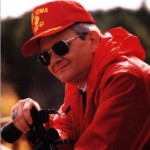The timing is extremely odd, but the death of techno-thriller author Tom Clancy came this week just when federal workers were being furloughed by the hundreds of thousands through Capitol Hill gridlock.
Clancy, who died in Baltimore at 66, did much in the 1980s to makes heroes of the men and women who served the government as military personnel, contractors or intelligence agency operatives and analysts. Technology helped make them great.
It was a substantial cultural transformation. The government had taken some very bad hits during the Vietnam War for wanton killing of civilians and lying to the American people. Nixon ruined trust with Watergate. Jimmy Carter (although an Annapolis graduate) epitomized Washington incompetence.
Then a B-list actor and advertising pitchman named Ronald Reagan made the military and fancy gizmos romantic and desirable again as he pushed one of the largest peacetime defense buildups ever. It was Reagan who helped make Clancy a literary star by praising his first novel, “The Hunt for Red October,” which was loosely based on a Soviet destroyer captain who tried to defect in the Baltic Sea with his ship.
While Clancy’s characters were always simple, shallow and predictable, they were extremely likeable. Thus, he boosted the D.C., Maryland and Virginia region that is heavily dependent upon federal jobs. If you had grown up with the military and lived anywhere around the area, you could easily recognize the scenes: Hampton Boulevard running up to the Naval Base in Norfolk, Pautuxent Naval Air Station in Southern Maryland, the Marine Base and FBI training center at Quantico and, of course, the bucolic setting of the CIA at Langley.
Clancy’s characters were typically stand-up men and women who preferred serving their country to more selfish endeavors like making money, although super hero Jack Ryan apparently made millions on Wall Street before giving it up to become a CIA analyst and global trouble shooter. His sexy and smart wife was a highly-successful eye surgeon.
Many of the characters were Irish Catholics from Baltimore and rooted for the Colts or the Ravens and sometimes the Redskins. You had your occasional token African-American or Japanese-American, in one case an ugly F-15 jet fighter pilot who was a woman.
The bad guys were carbon copies of fascists, commies and cruel-hearted dictators. At the time when his first novels were coming out, I was posted in the Soviet Union as a news correspondent. They made for great and light reading on the long plane rides over.
But once I got to know more about Moscow and other Evil Empire spots, I realized just how goofy Clancy really was. Real Russians didn’t talk the way he set up his dialogue. The timing was also way off. “The Cardinal of the Kremlin”of the 1980s was based on 1960s master spy Oleg Penkovsky who was executed around the time of the Cuban Missile Crisis. One hotshot, female CIA operative who got the eye for cheering her son on at a Moscow hockey game was actually based on a real CIA officer who got caught in a much more mundane way by sloppily leaving secrets near a major rail bridge over the Moscow River.
One problem was that Clancy was stealing examples from years before as the Soviet Union was changing extremely quickly and then crumbling. I always made that connection when I tucked my over-heated Clancy novel away in my bag when I landed at Moscow’s Sheremetyevo Airport and faced the passport and customs control officials of what was really a Third World country (albeit one with rockets).
For that matter, Clancy’s “SOSUS” network of underwater microphones spanning the Atlantic in the 1980s to listen for Russian submarines had actually been set up in the 1950s.
Even so, technology was the real hero in Clancy’s novels. It was just in time for the 1980s. After stagflation and economic misery, Reagan’s government spending was creating a real Keynesian and defense-based economic boom (leaving a lot of debt, no matter what conservatives say today). Personal computers were starting to overtake mainframes and the Internet was in its infancy. A lot of the gear actually did come from the military and Clancy exploited this like the master reporter he was.
Naturally, the technology was nearly Godlike in its infallibility. It ALWAYS worked regardless whether it was a space-based laser, an underwater sonobuoy or an ultra-fast microburst radio transmitter. American grunts were always brave. Pilots never mistakenly bombed civilians. Clancy’s later work was a lot weaker, involving barely disguised advertising tomes for various parts of the defense machine.
Personally, Clancy did not seem like a nice man. A chubby, near-sighted insurance salesman who lived for years in Maryland’s rural Calvert County, he always seemed to have an inferiority complex that he made up for by shooting off pistols with the FBI or creating admirable military and spy officials that he never could be.
He was perhaps the biggest and best marketer for Virginia and his home state of Maryland. So, it is indeed ironic that the conservatives who adored Clancy and his comic book world likewise hate the very same federal workers and the government that employs them. They are now being punished for Congress’s lack of political skill.
